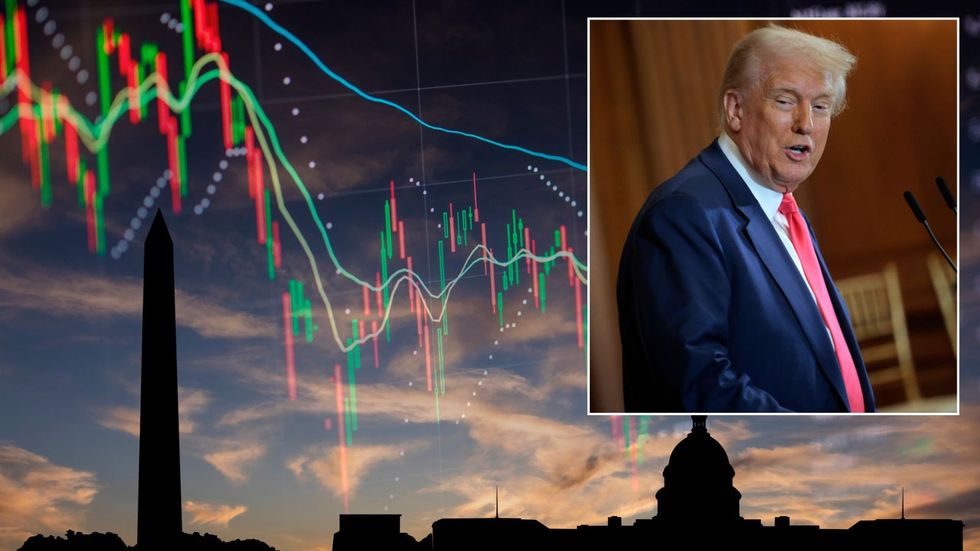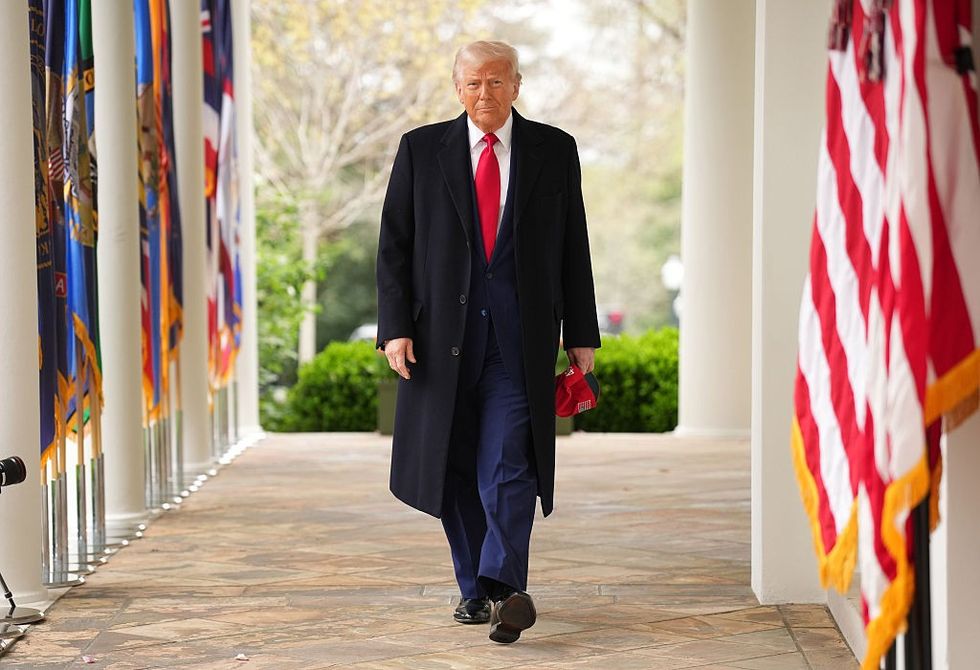WATCH: Keir Starmer meets with business leaders to discuss Trump tariffs
GB News
Markets initially surged Tuesday morning as investors sought buying opportunities after three days of carnage
Don't Miss
Most Read
Trending on GB News
US stocks suffered a dramatic reversal on Tuesday as an initial rally collapsed after the White House confirmed 104 per cent tariffs on Chinese goods would take effect after midnight.
What began as a massive rally on Wall Street turned into yet another sizeable decline, extending a four-day market rout that has rattled investors worldwide.
The Dow Jones Industrial Average dropped 320.01 points, or 0.84 per cent, closing at 37,645.59.
Markets initially surged Tuesday morning as investors sought buying opportunities after three days of carnage, with the Dow up as much as 3.9 per cent at its peak. The relief was short-lived.

US stocks suffered a dramatic reversal on Tuesday as an initial rally collapsed after the White House confirmed 104 per cent tariffs on Chinese goods would take effect after midnight
Getty
The four-day market rout has now cost the Dow more than 4,500 points amid escalating trade tensions.
The S&P 500 declined 1.57 per cent to end at 4,982.77, falling below 5,000 for the first time since April 2024.
It was inches away from closing in a bear market, down nearly 19 per cent from its February record.
Over the past four days, the S&P 500 has plummeted more than 12 per cent.
The tech-heavy Nasdaq Composite fell 2.15 per cent, ending at 15,267.91 after rising as much as 4.5 per cent earlier in the day.
The Nasdaq has lost more than 13 per cent during this four-day selloff.
Apple shares closed nearly 5 per cent lower, having lost nearly 23 per cent over the past four trading sessions.
Stocks began the day higher with traders citing an oversold market as reason for the bounce.
"This is a very normal action and very technical in nature after a shock period," said Truist's Keith Lerner. "The market is extremely oversold, and markets don't move in a linear fashion."
The price-to-earnings ratio of S&P 500 companies closed below 17 on Monday — historically cheap, giving investors a chance to scoop up stocks they believed might be oversold.
Lerner noted that historic market rebounds tend to be clustered with massive declines, as investors with FOMO worry they could miss out on a rally.
Investor optimism was also briefly buoyed by signs the US would negotiate arrangements to lower tariffs with major trading partners.
The rally evaporated after White House Press Secretary Karoline Leavitt announced Tuesday that President Donald Trump would impose an additional 84 per cent in levies across all Chinese imports on Wednesday.
This would mean all goods from China are subject to a tariff of at least 104 per cent.
US Trade Representative Jamieson Greer reaffirmed during a Senate Finance Committee hearing that Trump's massive reciprocal tariffs will go into effect Wednesday.
China's Commerce Ministry responded defiantly on Tuesday, saying the country would "fight to the end" of the trade war.
The escalating trade war between the world's two largest economies is turning into a high-stakes game of chicken.
Investor anxiety has reached extreme levels, with Wall Street's fear gauge, the VIX index, edging higher Tuesday after spiking to historic levels in previous sessions.
"Extreme fear" was the sentiment driving markets, according to CNN's Fear and Greed index, though the indicator showed mood had slightly improved since Monday.

Donald Trump
Getty
"(Traders) are peeking around every corner looking for even the slightest whiff of a trade deal or movement on the tariff front," said Jamie Cox, managing director at Harris Financial group.
"The market is wound up for a face-ripping rally," Cox added.
Thomas Martin, senior portfolio manager at Globalt Investments, cautioned: "We're not anywhere out of the woods yet."
Investors were encouraged by signs of potential trade negotiations with other countries.
Trump posted on social media that he had "a great call with the Acting President of South Korea."
On Monday, Trump spoke with Japan's Prime Minister Shigeru Ishiba, who will send a team to Washington to negotiate a trade deal.
Treasury Secretary Scott Bessent told CNBC that around 70 countries had approached the US for tariff negotiations.
White House National Economic Council Director Kevin Hassett said the administration is managing "a massive number of requests for negotiations" from nations.
The European Union's executive arm said the bloc is prepared to negotiate with the United States over buying more of its liquefied natural gas.
Any escalation of the trade war would probably lead to a US and global recession this year, according to multiple Wall Street banks.
Goldman Sachs and JPMorgan Chase have both issued warnings over the past week.
JPMorgan Chase CEO Jamie Dimon warned in his annual letter to shareholders Monday that Trump's tariffs would raise prices, slow the global economy and weaken America's standing.
Even some of Trump's allies, including Elon Musk and Bill Ackman, have recently warned that tariffs rely on extremely flawed logic.
Robert Ruggirello, chief investment officer at Brave Eagle Wealth Management, said market stability requires consistent policy.
"There has to be some staying power, something [where] corporations can make longer-term capital allocation decisions."








